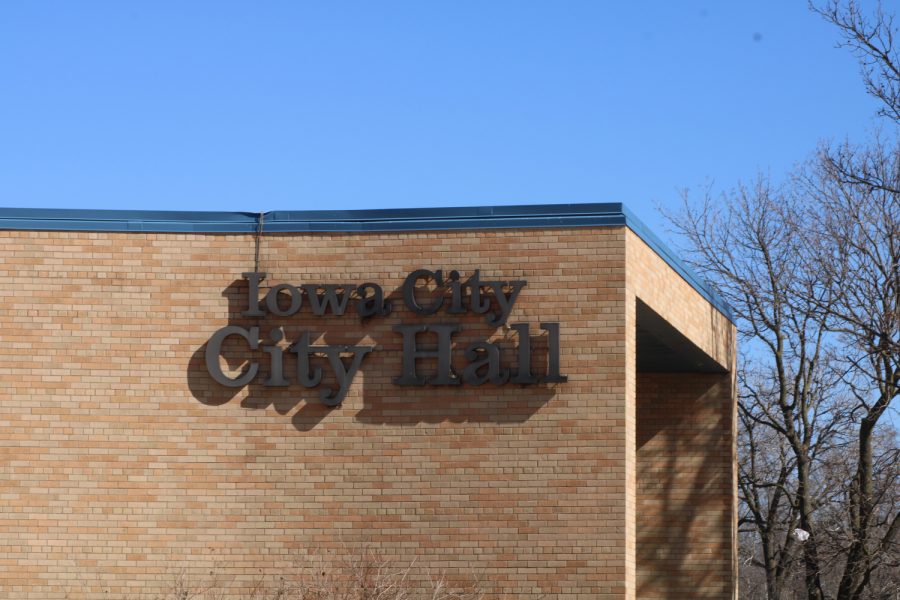Iowa City sees successes in emissions reduction, electric vehicle use
In a climate action progress report released by the city, Iowa City has seen a downward trend in greenhouse gasses, increased electric vehicle use, and increased recycling and composting.
The Iowa City City Hall is seen in Iowa City on Wednesday, March 2, 2023.
March 30, 2023
The City of Iowa City recently released a climate action progress report, which showed successes in emission reduction and clean transit.
The report with 2018-22 data was released in the city council’s March 16 information packet and covers various climate action topics including transportation, city climate action grant initiatives, and greenhouse gas emissions.
Iowa City Climate Action and Outreach Analyst Daniel Bissell said the data helps the city see its progress in its Climate Action Plan.
The city’s primary climate goal is to reduce its greenhouse gas emissions by 45 percent by 2030 and achieve net-zero emission levels by 2050, Bissell said.
A couple important takeaways from the report, Bissell said, is that buildings and building-related energy use are the most significant contributors to harmful emissions in Iowa City. To combat this, Bissell said the city has an insulation grant program, which assists qualifying residents with financing increased insulation in their homes.
However, the city has seen recent success in adopting electric vehicles.
RELATED: Iowa City plans to have a fully electric bus fleet in the future
Regarding electric vehicle adoption, Iowa City Climate Action Coordinator Sarah Gardner said Iowa City developed a robust electric vehicle public charging network. Gardner said the city aims to have the equivalent of 450 electric vehicle charging stations per a million people.
“We don’t have a million people in Iowa City, obviously, but when you adjust for the population size, we actually have what would be the equivalent of 650 charging locations for a million people,” Gardner said. “The city has really been a leader in putting charging stations in every one of our public charging ramps.”
Gardner added the city also has a grant program to assist residents and landlords in funding their own personal electric vehicle charging stations within apartment and condominium complexes.
The report also revealed that Iowa City’s greenhouse gas emission levels are on a downward trend despite a slight uptick seen in 2021, Gardner said.
“In this case, we know that that uptick comes from resumption of activity following the pandemic in part, but we have every confidence that we are going to meet that 2030 goal of 45 percent reduction,” Gardner said.
An area where the city has seen some recent struggles is the amount of waste within the city’s landfills increasing despite large increases in recycling and composting, the report outlines.
Iowa City Recycling Coordinator Jane Wilch said this waste increase is because of two factors: the COVID-19 pandemic and the August 2020 derecho that impacted the area.
Both events led to increased use of disposable materials and higher waste levels in the city landfills, Wilch said.
The success with increased recycling and composting has come from several city-wide programs and initiatives, including improved education and outreach efforts, an expanded list for acceptable compost items, and an increase in available recycling containers for residents, Wilch said.
The city continues to look ahead to see what other ways they can improve recycling efforts, specifically when it comes to single-use plastics, Wilch said.
“One of the solutions that we were very seriously looking at was options for a reusable container program, especially in the lens of takeout food,” Wilch said. “That was something that just was not feasible during the pandemic, for obvious reasons with public health concerns, so that is something that we’ll continue to look at if there’s feasibility locally for that.”



